A Tranny in Twin Peaks
A retrospective on the trans character in Twin Peaks (1990-1991) and Twin Peaks: The Return (2017).
I’ve been watching a lot of David Lynch films lately. Lost Highway, Mulholland Drive, Blue Velvet, Twin Peaks. Especially Twin Peaks.
There was something uniquely Lynchian about everything he made. If someone put on a film of his that you’d never seen before, you’d be able to tell it was made by him immediately. From the very first frame, from the Angelo Badalamenti score, from the abject strangeness and beauty of it all. Americana and liminal space, the uncanny valley and cherry pie. Each film seemed almost to blend and come together and exist loosely in the same shared universe of ephemeral blondes, murderous psychopaths, and lost highways. He swam deep into the creative well to find the big fish, as he would say. There was no one quite like him.
But there’s something I’ve been grappling with in the wake of Lynch’s death. In rewatching Twin Peaks, I was reintroduced to a character I had completely forgotten about: Denis, “Denise” Bryson, an FBI agent played by David Duchovny. The character is also a trans-identifying man. When he first arrives in Twin Peaks, in a long brown wig, cherry-pie red lipstick, and a woman’s suit, his presence feels just as surreal as the rest of the town and the characters in it. As if it was intentional. As if we’re supposed to be dismayed and stunned maybe even a little afraid of him. (Many of the show’s characters are hiding sinister intentions or are at the very least quirked up.) But as we’ll see, that was very much not what Lynch intended.
Lynch wanted to create a sympathetic representation of a trans-identifying character. He must have ok’ed the character, likely would have had to push for him to be included in the show, and even had his own character defend him on-screen in the third season. And as a die-hard Lynch fangirl (I ran Lynch-themed Tumblr blog in high school with 10,000+ followers) who opposes gender ideology and everything it entails, I don’t know what to do with that.
In this piece, I’ll walk through each appearance of Duchovny’s character on the show, contextualize them, and explain how I’ve attempted to rationalize this character’s existence in the show before finally giving in to the reality that Lynch was a supporter of transgenderism, and that not all of your heroes will be on the right side of history, as they say.
What is Twin Peaks?
(No, not the breastaurant.) Twin Peaks is a surrealist crime drama that aired on ABC from 1990 to 1991. (The long-awaited third season aired on Showtime in 2017.) Set in the tiny Washington town of Twin Peaks, the show centers around the murder of a high school girl, Laura Palmer (Sheryl Lee), the FBI agent sent in to help solve her murder, Special Agent Dale Cooper, (Kyle MacLachlan) and the oddball cast of characters who inhabit the town. It was unlike anything else that aired on network television at the time, and unlike anything I've seen since. Viewers have compared it to The X Files, Fargo, Northern Exposure, and Outer Range, but I don’t think anything comes close to matching the atmosphere, surrealism, humor, or horror of Twin Peaks. The show was a critical and commercial success, particularly in its first season, building a dedicated fan base and a cult following that persists to this day.
First appearance: season 2, episode 11
We hear about Denise before we see him. The show sets up a character for us to expect: a tough, experienced FBI agent, and “one of the brightest minds in the DEA”. This image is shattered as soon as David Duchovny walks through the door dressed as a woman. The characters present in the scene, Special Agent Dale Cooper, Sheriff Harry Truman, and Deputy Hawk Hill, are just as caught off guard as we are.
“Coop!” Denise coyly greets his old friend. Cooper squints and stares back, as if unable to believe his eyes.
“Denis?” He asks, unsure if it’s really him.
“It’s a long story, but actually I prefer Denise if you don’t mind.” Denise introduces himself, mock-bashful yet utterly self-assured, confident that the men in the room will play along.
Denise proceeds to shake Cooper and Truman’s hands not like a man, and not even like a woman, but like a man’s caricature of a woman, limply placing his fingers and palm into theirs as if handing over a delicate flower. It’s a strange kind of power play, a weird forced acknowledgement of his alleged femaleness. If we are to apply what we know about AGPs to this character, and I believe we can based on his masculine job, appearance, and later-in-life transition, then it’s also a subtle way to make everyone in the room uncomfortable and likely get a little titillated himself.
This power play is continued when Denise goes to leave. He shakes Truman’s hand again, this time looking him in the eye and adding a little “mm”, to imply that he finds the sheriff yummy. If a man did this, it would be sexual harassment. Good thing Denise is a woman, right? Of course, no woman would ever behave this way, especially not in a professional setting, further proving that Denise is playing out a heterosexual or bisexual man’s fantasy of what it’s like to move through the world as a beautiful woman.
Deputy Hawk refuses to shake Denise’s hand. As the only Native American character on the show, you’d think he’d be falling over himself to affirm this obviously two-spirit adjacent individual, but instead he keeps his distance, remaining silent and avoiding any physical touch with Denise. I believe the trans lobby has largely overestimated the Native American community’s support for transgenderism in public life, especially considering this demographic’s significant right-wing shift in an election cycle where transgender topics were especially hot button.
Cooper, ever the gentleman perhaps to a fault, immediately acquiesces to Denise’s new identity, using his new name and going about business as usual. It’s worth noting, however, that Denise is here to investigate Cooper for drug-related charges. It would obviously behoove Cooper to play nice and respect Denise’s new identity.
The script is a little less forgiving, introducing Denise as “a thin MAN in an Ann Taylor Suit. Long skirt. Light makeup”, and later as simply “MAN IN DRESS”. Truman and Hawk make similar digs at Denise throughout the scene. When Cooper tells Denise he’s in for a real surprise at how good the is food at their shared hotel, Truman whispers under his breath, “so are they.” After Denise leaves the room, Hawk declares “That’s a good color for him.” He doesn’t refer to Denise as a she, and no one corrects him. I miss the good old days when people automatically referred to a man as a ‘he’, even if he happened to be wearing a dress and lipstick. I’m sure Deputy Hawk does, too.
Later on in the episode, Cooper meets Denise in their hotel bar, where a wedding reception is being held. Denise holds up a bouquet of flowers, which he caught during the bouquet toss. “Unfair advantage,” he says, “how many of those girls were varsity wide receivers?” This detail about Denise’s background again points to his likely AGP orientation. Denise is hyper-masculine, probably heterosexual, and has a history of stereotypically male interests and pastimes, all clear indications that his new “identity” is really a sexual paraphilia.
This line is also a subtle nod to the absurdity of men competing in women’s sports. Denise himself acknowledges the physical advantage he has over women in something as simple as catching - so why wouldn’t that advantage also apply to running, swimming, biking, etc.? Audiences in the 90s may have accepted Denise, but they would never have accepted a man competing against women in their own sport.
In the same scene, Denise informs Cooper of the cocaine residue found in his car. “Denis, this cannot appear straight to you,” Cooper says, referring to Denise by his given name. Denise gently corrects him, Cooper apologies, and they move on. This calm, reasoned interaction presents a marked difference from so many real-life “misgendering” and “deadnaming” incidents, wherein the trans-identified individual makes a scene, storms out, or even threatens violence. A particularly popular response seems to be some form of “meet me outside.” How ladylike.
Trans-identified men in particular react this way because for them, being perceived and treated as a woman is a kind of sexual fantasy, a form of live-action degradation porn wherein the most degrading thing you can be is a woman. Whoever shatters this illusion is not just trampling upon their chosen identity and victim status, but disrupting their ultimate fantasy, in essence, stopping them from getting off. If Denise were real, I do not think he would react so kindly. Although to be fair, trans-identified men are known for taking out their anger on women far more viciously than men.
Denise agrees to help Cooper prove his innocence because he’s “trying to get more in touch with his feelings.” We then get Denise’s version of why he transitioned. While on a drug bust, Denise and his partner discovered that the seller would “only sell to transvestites”, so Denise went undercover and found that wearing women’s clothes “relaxed” him. Sure, Denise. That’s one way to say “I’m an autogynephile.”
Second appearance: season 2, episode 12
We next see Denise again at the Great Northern Hotel, where both he and Agent Cooper are staying. Audrey Horne, the owner’s teenage daughter, enters Cooper’s room to give him some potentially exculpatory evidence in his drug case. Denise then enters in full wig, makeup, and skirt ensemble. Audrey appears stunned as the two are introduced. “They have women agents?” she asks. “More or less,” Denise answers. His reply is unique to the time, as no TV show today could include such a joke at a trans character’s expense and expect to get away with it.
This interaction is, of course, absurd. No one is stupid enough to see Denise and think he's a woman. Especially not a high school girl who grew up in a small Pacific Northwestern town in the 1980s. She would see a man in a dress. It’s both disappointing and inaccurate that Audrey would have only Denise to look up to as a female FBI agent, even in the early 90s. By that time, Jodie Foster had already starred as Agent Clarice Starling in The Silence of the the Lambs (also a film about an AGP), and just a few years later, Gillian Anderson would star as Agent Dana Scully in the The X Files (also alongside David Duchonvey).
In real life, the FBI has accepted female agents since 1972, when Susan Malone and Joanne Pierce Misko, a former Catholic nun, became the first two women to be sworn in. In 1976, Sylvia Mathis became the first black woman to serve, working in organized crime and interviewing survivors of the 1978 Jonestown massacre. It goes without saying that these real-life women and the ones portrayed on TV would have served as significantly more positive role models for someone like Audrey. Plus, these women made careers for themselves without moving through the world as men for most of their lives.
We next encounter Denise at the Double R diner, a popular spot in town. The camera is angled on his giant man feet in women’s heels. It pans up slowly, showing off his shaven, shapely legs. He sits down at the table of a lone male patron, Ernie, and coerces him into participating in a drug bust by threatening to put him back in prison. In the middle of his little speech, he takes out a compact mirror and rather theatrically touches up his lipstick. Of course, real women know that reapplying makeup at the table is extremely tacky. Only a man pretending to be a woman would do something like that. This gesture also serves as another weird little power play for Denise, threatening a man while lording his supposed femininity over him as if to say “I may be a man in a dress, but you still have to acquiesce to me. Isn’t that humiliating?”
This is continued in the next scene, where Cooper and Denise question Ernie. Denise sits perched on the bed frame with his leg planted firmly on Ernie’s chair, while wearing a skirt no less. (Again, no woman would do this.) He holds Ernie’s hand and tells him, rather authoritatively, exactly what he’s going to do.
Third appearance: season 2, episode 13
In Denise’s final episode, we see him coaxing Ernie into setting up a drug bust by calling up hardened criminal Jean Renault. After performatively filing his nails in the corner, Denise stands behind Ernie and pinches his cheek. It happens quickly so it’s easy to miss, but Ernie knocks his hand away then immediately wipes the spot Denise touched with a tissue.
The next time we see Denise, he looks a little different. As Cooper and Truman are wiretapping Ernie for the bust, Denise enters Truman’s office dressed as a normal man. “You can call me Dennis.” He says. “It somehow seemed more appropriate.” Watching this scene, it suddenly struck me how normal and attractive David Duchovny looks out of drag. The before and after is a sobering reminder of the destructive, totalizing nature of trans ideology. Since men make very ugly and unconvincing women, they appear pathetic, funny, or downright scary when dressed as them. No one sees a woman when they look at these men — they see either a joke or a sexual predator.
Meanwhile, the drug bust does not go according to plan. Jean Renault and his henchman discover the wire and take Ernie and Denise hostage. Cooper exchanges himself for the hostages, and Jean debates killing him. To stop the standoff, Denise gets dressed up in drag again and approaches carrying a tray of food. Unbelievably, Jean mistakes Denise for a woman. “It's just a girl,” he says, as a 6-foot tall David Duchovny approaches in a dress and heels. The image is unsettling, funny, and very Twin Peaks.
Once Jean lets Denise in, Denise lifts up his skirt to reveal a gun tucked into his stocking. Cooper grabs the gun just as Jean recognizes Denise and together Cooper and Denise subdue and arrest Jean and the henchman. The gun in the holster is an obvious dick joke, a reference to the male power — and danger — hidden underneath his skirt. This is made doubly apparent in the masculine, aggressive way in which Denise is able to subdue the bad guys. It’s a joke that would never fly today, which only makes it all the more prescient. Hidden under every AGP’s ill-fitting dress and pair of fishnet stockings is a man, and usually a dangerous and sexually aggressive one at that.
This scene concludes Denise’s arc on the original series. We won’t see him again for another 25 years.
Final appearance: The return, part four
By 2017, a lot had changed in terms of “trans representation”. While the media had yet to reach peak levels of trans-insanity, they were well on their way. You could no longer make jokes at the expense of the trans-identified. “Mis-gendering” was definitely off the table. Even depicting them as prostitutes and sexual predators, as was the norm prior to then, was starting to become off-limits.
Instead of the quirky, off-color, mostly sympathetic but still self-aware portrayal of Denise we got in 1991, this Denise is much more serious. The show’s tone around him is less funny and more social justice-y. Gone is the red lipstick and long brown wig. Instead, we see Denise in subdued pinks and grays, and a shorter, layered haircut. But perhaps the starkest difference is Denise’s job: he's been promoted from agent to head of the FBI.
FBI Deputy Director Gordon Cole, played by David Lynch himself, gives a little speech that summarizes Denise’s trajectory since we last saw him.
“Before you were Denise, when you were Dennis, and I was your boss, when I had you working undercover at the DEA, you were a confused and wild thing sometimes. I had enough dirt on you to fill the Grand Canyon, and I never used a spoonful, because you were, and are, a great agent. And when you became Denise, I told all your colleagues, those clown comics, to fix their hearts or die.”
This speech casts Denise as a victim of prejudice, but Denise’s experience directly contradicts that of real-life trans-identified people in government, especially under the Biden Administration. Rachel Levine, a trans-identifying man and ideologue who openly advocated for child castration, was confirmed as Assistant Secretary for Health of the Department of Health and Human Services under Biden. Despite being a man, he was celebrated as the first woman to hold the position and was even crowned “Woman of the Year” by USA Today in 2022. Other “gender-diverse” appointees like Sam Brinton similarly rose in the Biden ranks, despite being an obvious sex pest and luggage thief.
David Lynch’s character concludes his speech with one of the most quoted lines of the show by the trans-identified and their accomplices: “fix [your] hearts or die.” This has become a sort of rallying cry for trans activists, a call to accept trans-identified people as the sex they say they are, allow them into opposite sex spaces, sports teams, and prisons, give them special privileges and allowances, put them on TV and in movies and in the government, allow them to lie about their sex on government documents, teach gender ideology in schools, give chemical castration drugs to children, make the government pay for their bodily mutilation surgeries — or die. This is exactly what trans-identified people are calling for when they throw out meaningless platitudes like “be kind” or thought-stopping cliches like “trans women are women”: total capitulation to the entire list, and nothing less.
The problem is, many of us did fix our hearts, just not in the way David Lynch, Hollywood, and the mainstream media wanted us to. Instead of siding with the sexual terrorists, we sided with their victims. With trans widows and orphans, desisters and de-transitioners, the victims of doxxing and online harassment, those who have been shamed and kowtowed into silence or submission, women who lost medals and placements to male athletes, and victims of sexual harassment, abuse, and violence at the hands of trans-identified men. Fix your hearts or die, indeed.
As a fan, it’s hard not to be a little disappointed in David Lynch. Why did he push for this character? “Trans representation” in the 90s consisted mostly of perverted criminals like Buffalo Bill, or heterosexual men vomiting at the idea of sex with trans-identified men, like in The Crying Game or Ace Ventura Pet Detective. Denise marked a distinct shift in how trans-identified men were portrayed on film, out of the shadows and into legitimate channels of power. Denise’s arc, while initially tongue-in-cheek, is still sympathetic, sensitive, and trans-affirmative.
I believe in part, this has to do with the Arc of History Fallacy. There’s an infamous MLK jr. quote that states “the arc of history is long, but it bends toward justice.” It implies that although social change takes time, it only goes in one direction. Too many people have internalized this idea, leading them to conclude that accepting the cross-sex identities of unwell people is a progressive eventuality, that time can only move us further and further toward this goal. In this way, many have accepted defeat before it’s even happened, making it enormously challenging — though not impossible — to roll back trans concessions and privileges.
However, I think it’s important that we not forget the primary victim of trans ideology in this conversation — trans-identified people. I’m not trying to diminish the very real harm and suffering that these individuals have caused, but I think it’s important to recognize the harm that was done to them as well, even if it was mostly self-inflicted. I believe that doing away with trans ideology entirely will benefit not only the most vulnerable, but all of society, including and even especially those who identify as trans. Trans-identifying people, regardless of how you feel about them, are still human beings with inherent dignity and worth. They deserve love, not ideological lies.
For a while, giving trans-identifying people what they wanted may have seemed like the compassionate thing to do. They're such a tiny percent of the population, couldn’t you just be kind? Like Cooper calling Dennis “Denise”, and Gordon Cole defending him, too many people have believed that acquiescing to transgender demands is the kindest option, or at the very least, the path of least resistance.
But I believe telling the truth — about sex, human biology, the unsustainable nature of playing pretend — is the ultimate kindness. Helping someone like Denise reconcile with his birth sex, and therefore with reality, is always more conducive to human flourishing than enabling sexual fetishism, promoting maladaptive coping mechanisms, and encouraging the lie that body mutilation and living in permanent drag constitute an unshakeable piece of someone’s identity. Women, girls, children caught in the gender trap, and trans-identified people themselves, all deserve better. I’ve fixed my heart, and I don’t want anyone to die.




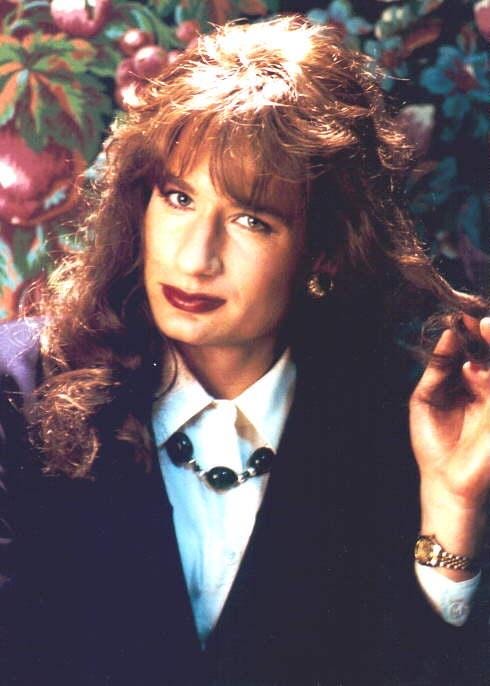
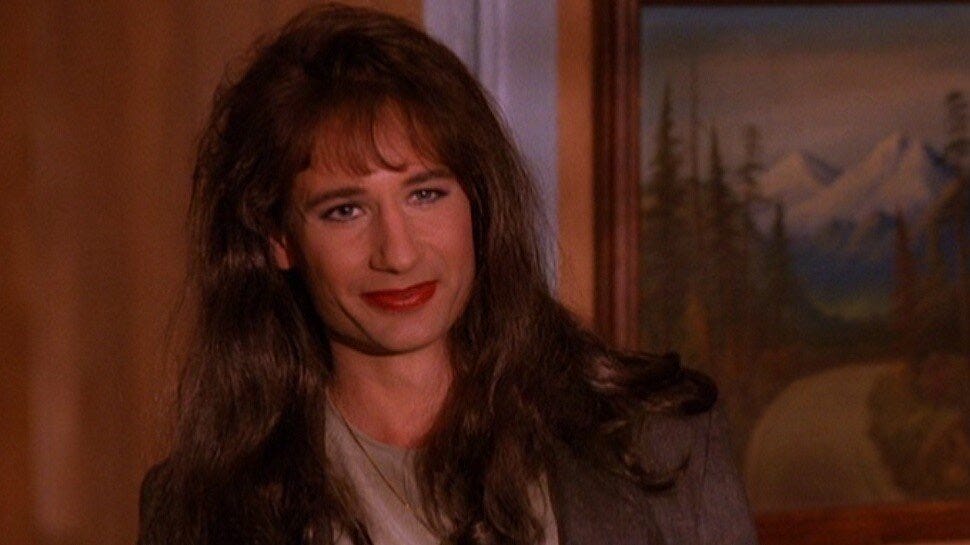
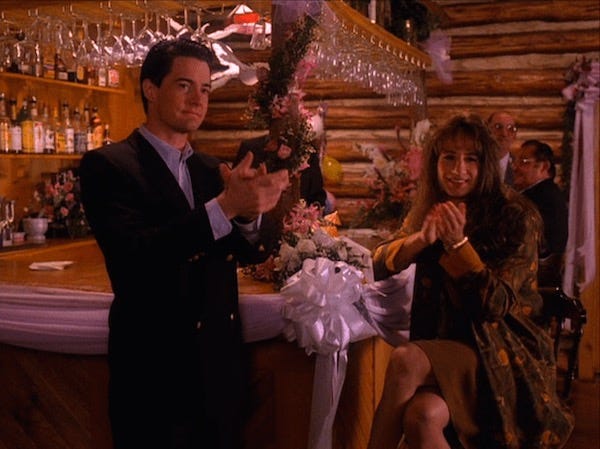

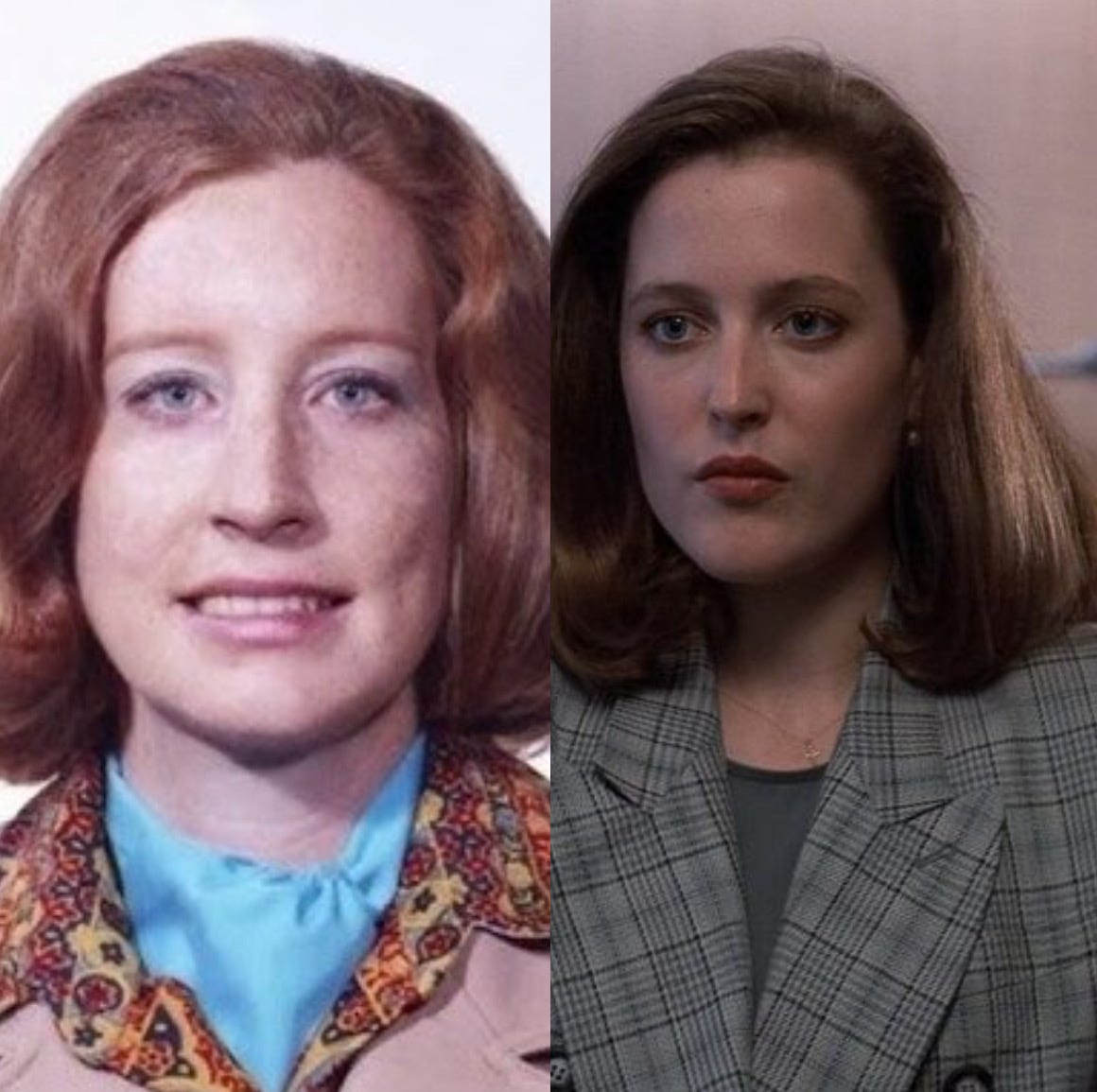

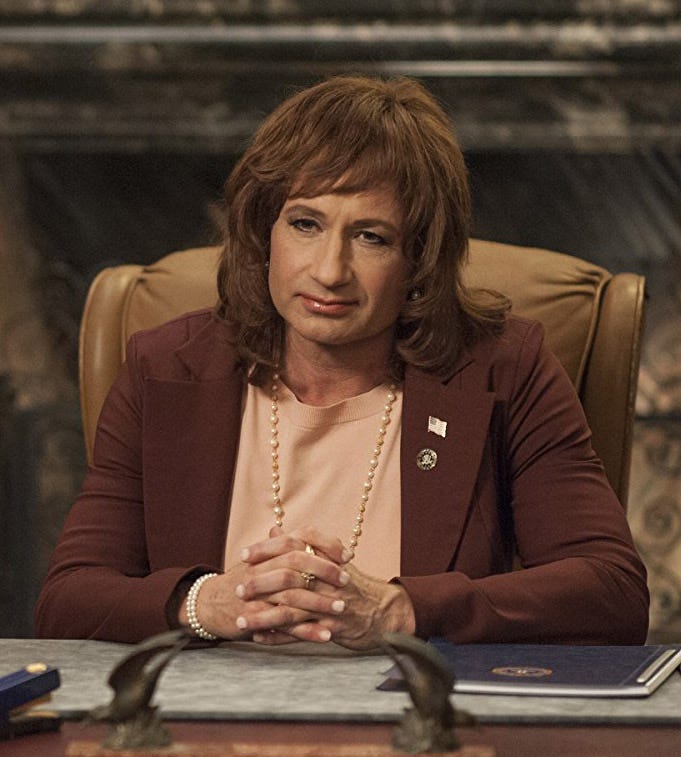
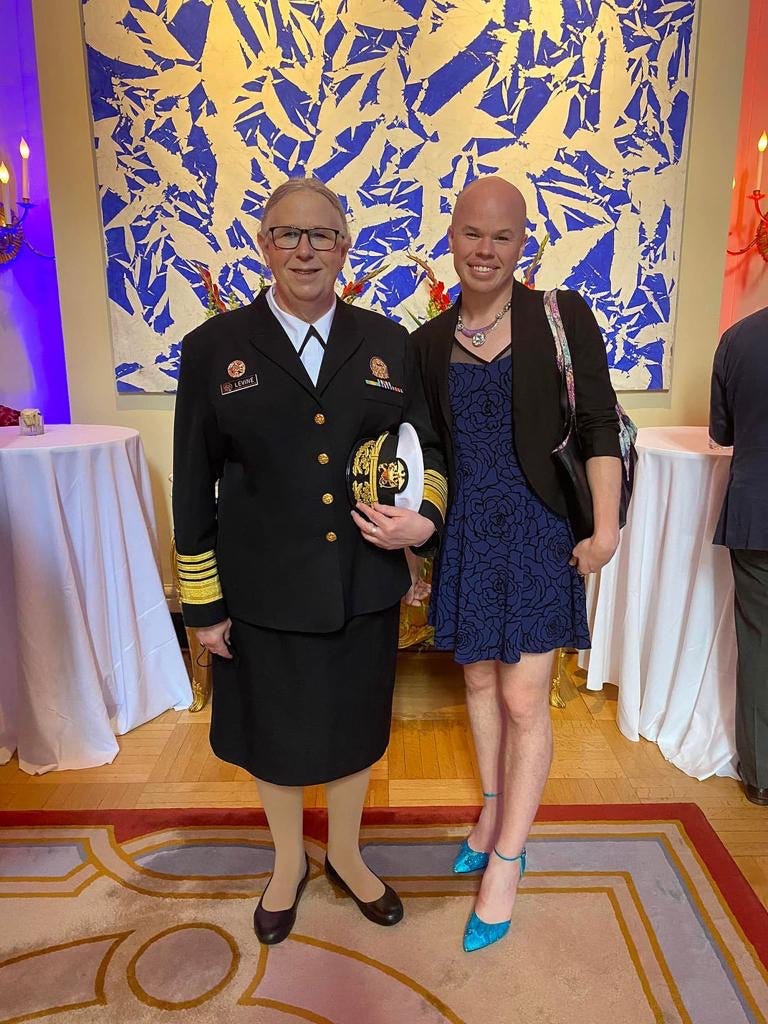
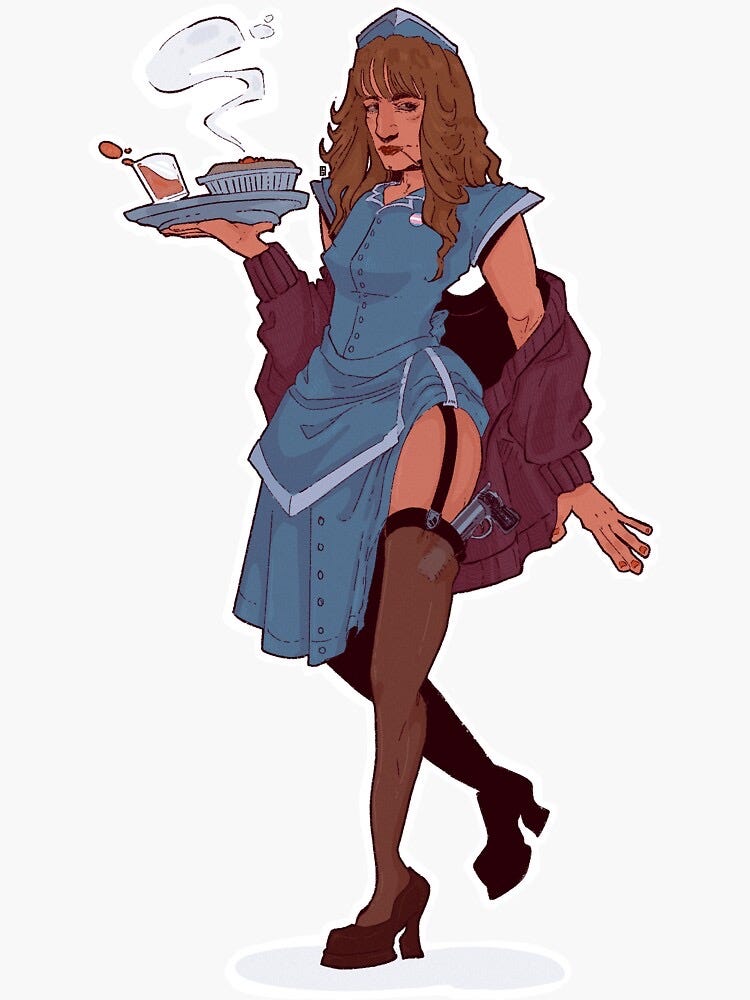
Well-done and sensitive, but it’s hard to place blame on Lynch I think. It’s called aging poorly.
Watch the “7-year Itch” with the Eyen character leering at Marilyn, or perhaps one of the “Charlie’s Angels”, when Drew Barrymore’s character gets her ass slapped - it’s not funny to me at all. I love “Verigo” but when James Stewart tells Kim Novak to dye her hair blonde, she protests and he says “Why should you care?” - the inherent misogyny is so overwhelming it’s stunning. It doesn’t make it a bad film at all but it suddenly makes it very dated, and throws you out of the “suspension of disbelief”. It’s like Mickey Rooney playing a Japanese caricature in “Breakfast at Tiffany’s”, breathtakingly awful.
I saw “Eraserhead” around 1980/81 in LA which had a lot of arthouse theatres at the time with long foldout lists of movies I loved to mark with highlighters for “must see” and out on the back of my door in my room at Caltech. The followed Lynch ever since, and talked with Dennis Hopper over his and an artist I worked with drunk afternoon of Champagne with friends in Venice about his being the “hero” in Blue Velvet. Then I saw it, so twisted.
I wouldn’t feel so bad, I think. It’s just that it makes the movies and TV shows very dated because we understand the trans delusion better today than at any time in history, as we understand misogyny, and racism better. His work is still astonishingly beautiful, like a living Ed Ruscha painting to me.
As you continue your retrospective. There were other problems with the show. Full disclosure, I was/am a big fan despite the flaws. After the storyline made it clear that Leland was the sexual abuser and ultimate murderer of his daughter. All the presentations of Laura Palmers made sense as the victim of familial sexual abuse.
But then, that was completely undone by granting Leland the Get Out Of Jail Free card…it really wasn’t HIM, he was possessed by the evil Bob. A coworker at the time was a victim of familial sexual abuse and she schooled me on how extremely disappointed she was that David Lynch fudged on such an important issue.
For her, he was making the argument that predators are really responsible for their evil. Food for thought.